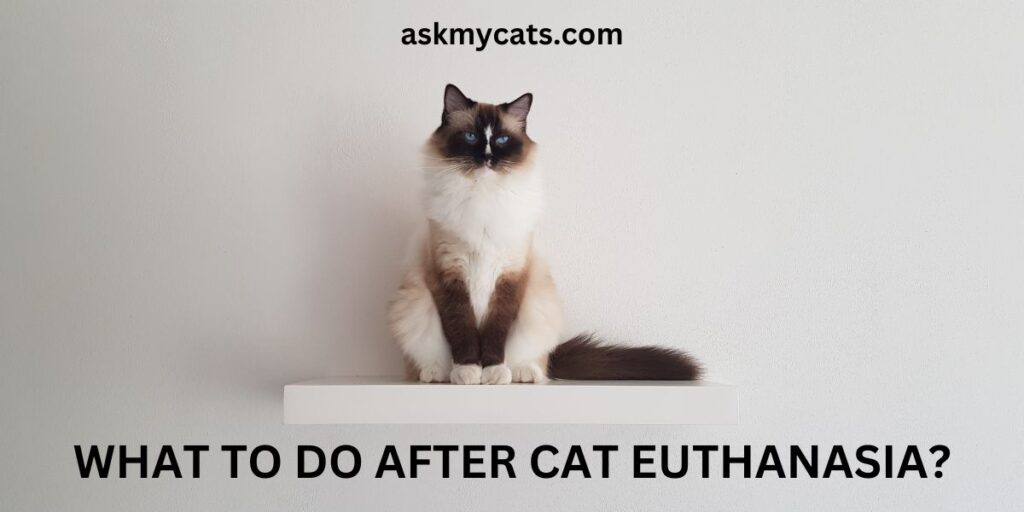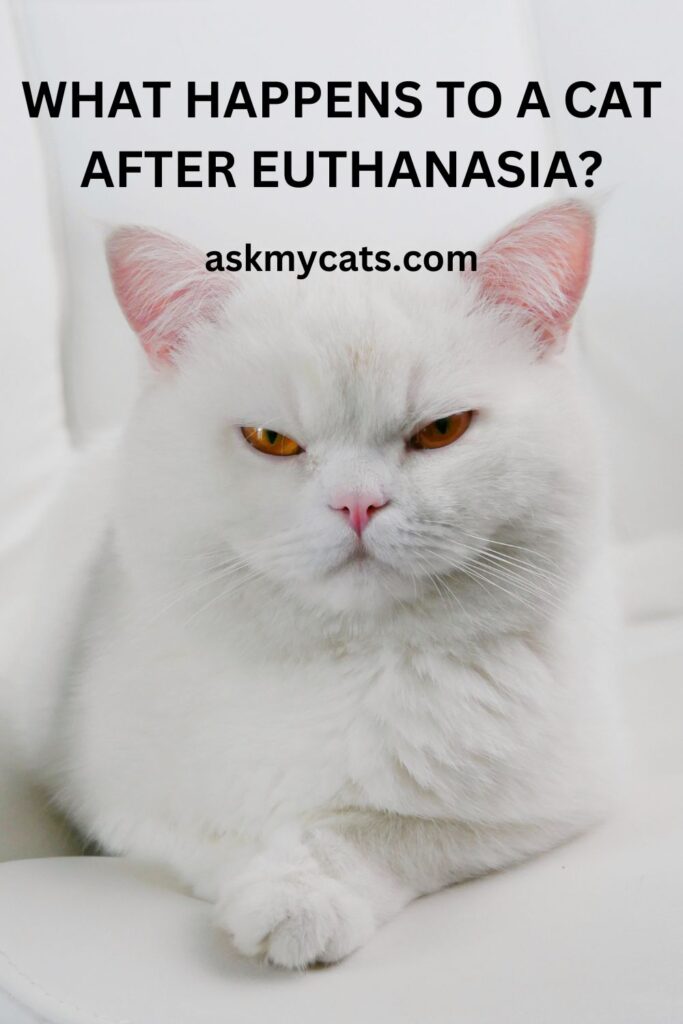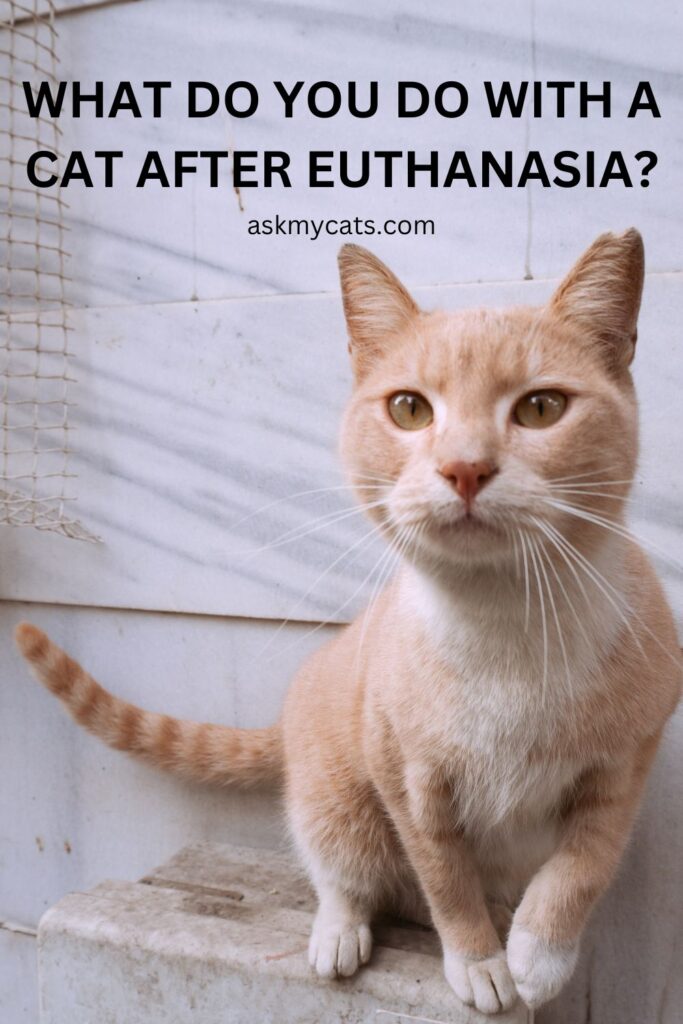Taking the decision to euthanize your pet cat is one of the toughest decisions a pet owner may have to face. And this decision can be so overwhelming that after your cat has been euthanized, you may find yourself blank and clueless about what to do next.
To help make this process easier, this article talks about the next steps after euthanizing a cat.
Key Takeaways
- Veterinarians have several options for disposing of euthanized cats, including burial at a pet cemetery or on private property, cremation (individually or with a group of other animals), and donating the body for research or education.
- Some pet owners may choose to bury their cats in their backyard or take the remains to a pet cemetery. Others may choose cremation and keep the ashes in an urn or scatter them in a special place.
- Pet owners can take their cat home after euthanasia, it is important to discuss this option with the veterinarian as they may have specific guidelines or recommendations for what to do with the cat’s remains.
- The final decision is usually made by the pet’s owner with the help of the veterinarian or animal hospital staff.


Give Your Cat the Perfect Day
Get the Free Ebook!
What Happens To A Cat After Euthanasia?

Euthanasia helps your cat pass away peacefully after having suffered from terminal illnesses or a very poor quality of life.
After a cat is euthanized, the body is typically taken to a veterinarian’s office or animal hospital where it can be disposed of properly. This typically includes being buried or cremated.
The veterinarian or animal hospital will usually offer a variety of options for the disposal of the cat’s remains, and the owner can choose the one that they feel is most appropriate.
Some pet owners may choose to bury their cats in their backyard or take the remains to a pet cemetery. Others may choose cremation and keep the ashes in an urn or scatter them in a special place.
The final decision is usually made by the pet’s owner with the help of the veterinarian or animal hospital staff.
Interesting Read: Choosing the Right Euthanasia Option: At-Home Vs. Vet Clinic
What Do You Do With A Cat After Euthanasia?

After a cat has been euthanized, the veterinarian or animal hospital staff will typically offer to take care of the remains for you. The options for disposing of the remains can include:
Burial: Some pet owners choose to bury their cats in their backyard or in a pet cemetery. If you choose to bury your cat at home, it is important to check with your local authorities to ensure that it is legal and to find out what type of container is required for the burial.
Cremation: This is a common option for pet owners who wish to keep the ashes of their cats. There are typically two types of cremation: private and communal.
In a private cremation, your cat is cremated alone and their ashes are returned to you. Communal cremation means that your cat will be cremated with other animals, and their ashes will not be returned to you.
Donating the body for research or education: Some pet owners choose to donate their cat’s body to a veterinary school or research facility for use in education or research.
Some animal hospitals or shelters may have their own policies for disposing of remains, you can check with them for more information.
The final decision is usually made by the pet’s owner with the help of the veterinarian or animal hospital staff. It’s important to discuss these options with them and choose the one that feels most comfortable and appropriate for you and your family.
Check out the in-depth guide: When To Put Your Cat Down? The Complete Checklist
Can You Take Your Cat Home After Euthanasia?
Yes, it is possible to take your cat home after euthanasia. It is important to discuss this option with your veterinarian, as they may have specific guidelines or recommendations for what to do with your cat’s remains.
Some pet owners choose to bury their cats at home, while others opt for cremation. It is also possible to arrange for a private cremation service, which allows you to keep your cat’s ashes at home.
It’s important to consider your own personal feelings and what you feel comfortable with.
Interesting Read: Is It Legal To Euthanize A Healthy Cat?
How Do Vets Dispose Of Euthanized Cats?

Veterinarians typically have several options for disposing of euthanized cats.
One option is to bury the cat at a pet cemetery or on private property with the owner’s permission.
Another option is cremation, which can be done individually or with a group of other animals.
In individual cremation, the ashes of the cat are returned to the owner. In group cremation, the ashes are not returned and the cremated remains are disposed of by the crematorium.
Some veterinarians may also offer a communal cremation service, which is where the ashes of the pet are not returned to the owner.
Additionally, Some municipalities may have regulations on how to dispose of euthanized animals, and veterinarians must follow these guidelines, which may include disposal in a sanitary landfill or rendering plant.
It’s important to discuss with your veterinarian about the options they offer and the local rules that apply.
Must Read: How To Deal With Regret And Grief After Putting Cat To Sleep?
Making Arrangements For The Cat’s Remains
Making arrangements for your cat’s remains after euthanasia include deciding the way of disposing of the body, coping with the emotions that follow, and learning about aftercare for yourself and your family.
It also includes thinking of ways to honor your pet cat’s memory.
Options For Disposing Of The Cat’s Remains: Cremation Or Burial
Here are some pros and cons to consider when deciding between cremation and burial for your pet cat:
Cremation:
| Pros of Cremation | Cons of Cremation |
|---|---|
| Cremation is a relatively quick process and the ashes can be returned to the owner within a week. | It can be more expensive than burial. |
| It allows for the ashes to be kept in a special urn or another keepsake, so the pet owner can have a tangible reminder of their pet. | Cremation doesn’t provide a place to visit the pet, it only provides ashes. |
| It also offers more flexibility in terms of where the ashes can be kept, whether it’s in a special place in the home or scattered in a meaningful location. |
Burial:
| Pros of Burial | Cons of Burial |
|---|---|
| Burial allows for a physical location to visit and remember the pet. | Burial requires a burial plot, which can be harder to find and maintain. |
| It can be less expensive than cremation. | It may not be allowed in certain areas, depending on local regulations. |
| It also allows for a traditional burial ceremony or memorial service. | Burial is not an option for those who are concerned about the environmental impact. |
Ultimately, the decision will depend on your personal preferences, beliefs, and circumstances. It’s important to take the time to consider your options and choose what feels best for you and your family.
Interesting Read: How To Euthanize A Cat With Over-The-Counter Drugs?
Factors To Consider When Making This Decision
Here are some personal and financial factors to consider when deciding between cremation and burial for your pet cat:
Personal Factors:
Emotional attachment: Some pet owners may find comfort in having a physical location to visit and remember their pets, while others may prefer to have the ashes in a special place in the home.
Religious or cultural beliefs: Some religious or cultural beliefs may have specific guidelines on how to handle the remains of a pet.
Environmental concerns: Some pet owners may prefer cremation over burial due to concerns about the impact of burying a pet on the environment.
Interesting Read: Role of Veterinary Doctor In Euthanasia
Financial Factors:
Cost: The cost of cremation and burial can vary depending on the location and services offered. Cremation may be more expensive than burial, but it also provides the option of keeping the ashes in a special urn or another keepsake.
Available resources: Pet owners should also consider if they have the resources to maintain a burial plot over time, or if they are comfortable with the cost of cremation.
It is important to consider both personal and financial factors when making this decision. It’s also important to discuss the options with your veterinarian and understand the regulations that apply to pet disposal in your area.
It’s important to remember that this is a personal decision, and what’s most important is that you do what feels right for you and your cat.
Interesting Read: How To Euthanize A Cat At Home?
Cremating Your Cat: Keep The Ashes Or Scatter Them In A Special Place?
Here are some pros and cons to consider when deciding whether to keep the ashes of your pet cat in an urn or scatter them in a special place after cremation:
Keeping the ashes in an urn:
Pros:
- Keeping the ashes in an urn allows for a tangible reminder of the pet, which can be kept in a special place in the home.
- An urn can be a focal point for remembering and honoring the pet and can be passed down through generations.
- It allows the pet owner to have the ashes with them wherever they go.
Cons:
- It can take up space in the home and may not be practical for pet owners with limited space.
- It may not be the best option for pet owners who are concerned about the environmental impact of keeping an urn.
Scattering the ashes in a special place:
Pros:
- Scattering the ashes in a special place can provide a sense of closure and allow the pet owner to say goodbye in a special location that holds meaning for the pet and the owner.
- It can be a way to honor the pet’s memory in a natural setting.
- It can also be an environmentally friendly option.
Cons:
- It may not provide a tangible reminder of the pet, which can be difficult for some pet owners.
- It may not be allowed in certain areas, depending on local regulations.
- It may not be the best option for pet owners who want to keep the ashes with them wherever they go.
Find Solution: My Cat Is Dying And I Have No Money!
Honoring The Cat’s Memory
Honoring your pet cat’s memory after euthanasia is important for you as the pet owner, as it allows you to grieve and process your loss in a meaningful way. It can provide a sense of closure and a way for you to remember and cherish the time you had with your beloved companion.
Honoring your pet’s memory can take many forms, from holding a memorial service to creating a special place in your home to remember the pet, to scattering the ashes in a meaningful location. It can also be as simple as keeping a photo or a special toy as a reminder of the pet.
It can also help you come to terms with your loss and start to heal from the grief. Having a tangible way to remember the pet can also be comforting for children and other members of the family who may have also loved the pet.
Also Read: Where To Euthanize A Cat For Free Or Cheap?
Ideas For Honoring The Cat’s Memory
Here are some ideas for honoring your pet cat’s memory after euthanasia:
- Holding a memorial service or ceremony with family and friends
- Creating a special photo album or scrapbook of memories with your pet
- Planting a tree or flower garden in memory of your pet
- Having a custom-made piece of jewelry or artwork that features your pet’s paw print or name
- Creating a special place in your home where you can remember and honor your pet, such as a special shelf or corner
- Donating to a pet-related charity in your pet’s name
- Scattering the ashes in a meaningful location that holds special significance for you and your pet
- Keeping a special toy or collar as a reminder of your pet
- Keeping a journal where you can write down your thoughts, feelings, and memories of your pet
- Creating a social media page or online memorial for your pet where you can share photos and memories with others.
Interesting Read: What Are The Different Methods Of Cat Euthanasia?
The Importance Of Finding Ways To Remember And Celebrate The Cat’s Life
It is important to find ways to remember, cherish, and celebrate the life of your cat after it passes away – due to euthanasia or any other cause. Such remembrance helps you heal from emotional wounds and brings joy even in such a glum circumstance.
Some important reasons why you should find ways to honor your cat’s memory are given below.
- It allows you to grieve and process your loss in a meaningful way
- It can provide closure and a way to move forward
- It helps you to remember the happy times and cherish the memories with your cat
- It helps you to honor the life of your cat and acknowledge its presence in your life
- It can be comforting for children and other members of the family who may have also loved the cat
- Interesting Read: Heartfelt Ideas for Cat Memorials
- It can be a way to celebrate the joy and love that your cat brought to your life
- It can help to keep the memory of your cat alive and can be a source of comfort and solace in difficult times.
- It can also be a way to keep the bond you shared with your cat alive, no matter how long ago the cat passed away
- It can serve as a reminder of the positive impact the cat had on your life and the life of others.
It’s important to remember that everyone’s grief process is different, so find a way that works best for you and your family to remember and celebrate your cat’s life, whether it’s a memorial, a special place in your home, a charity donation, or anything else.
Find out more details: Should I Stay With My Cat When It Is Euthanized?
Frequently Asked Questions
How soon after euthanasia can I have my cat cremated?
It depends on the crematorium, but it is usually possible to have your cat cremated within a week after euthanasia.
Can I bury my cat on my property?
It depends on local regulations, it is best to check with your local authorities regarding the laws and regulations for pet burials on private property.
Can I scatter my cat’s ashes in a public park or nature reserve?
It depends on local regulations, it’s best to check with the authorities regarding the laws and regulations for scattering ashes in public places.
How do I talk to my children about the loss of our pet cat?
It’s important, to be honest with your children about the loss of your pet cat. You can use age-appropriate language and allow them to express their feelings. It may be helpful to have a memorial service or create a special place in your home to remember the cat, so your children have a way to grieve and remember the cat.
Must Read: Did I Put My Cat To Sleep Too Soon?
Final Words
The decision of how to honor your cat’s memory after euthanasia is a personal one, and it’s important to consider both personal and financial factors when making this decision. It’s also important to discuss the options with your veterinarian and understand the regulations that apply to pet disposal in your area.
Remember, there are many ways to remember and celebrate your cat’s life, whether it’s a memorial service, planting a tree, scattering ashes in a meaningful location, or creating a special place in your home to remember your cat.
The most important thing is to find a way that feels right for you and your family. Grief is unique for everyone, and it’s important to take the time you need to process the loss of your beloved companion.
Must Read: The Impact Of Euthanasia Of Cat On Children
Interesting Read: Did My Cat Know He Was Being Put To Sleep?
You might also like to read: How Much Does It Cost To Euthanize A Cat?
You Might Also Like To Read:
- When To Euthanize A Cat With Cancer?
- When To Euthanize A Cat With Seizures?
- When To Euthanize A Cat With IBD?
- When To Euthanize A Cat With Kidney Failure?
- When To Euthanize A Cat With Feline Leukemia?
- When To Euthanize A Cat With Heart Failure?
- When To Euthanize A Cat With FIP?
- When To Euthanize A Cat With FIV?
- When To Euthanize A Cat With Dementia?
- When To Euthanize A Cat With Arthritis?
- When To Euthanize A Cat With Hyperthyroidism?

Making the process as quick as possible when trying to do pet euthanasia is something I’m sure my relatives will want to look into. That way, the grieving won’t be drawn out and they can move on with their lives on their own pace. Once we require something for our dying pet, I’ll make sure we look for a pet euthanasia service that can assist us.
Thank you for sharing your thoughts on pet euthanasia. I understand that when the time comes, it’s important to consider the well-being of both the pet and the family during such a difficult decision. It’s thoughtful of you to prioritize a quick and efficient process to minimize prolonged grief.
When the need arises, I would suggest researching and reaching out to reputable pet euthanasia services in your area. They can provide the assistance and support you and your family may require during this challenging time. Their expertise can ensure a peaceful and compassionate transition for your beloved pet, allowing you to begin the healing process at your own pace.
Remember, it’s essential to find a service that aligns with your values and offers the level of care and sensitivity you desire. I hope you and your family find comfort and solace in knowing that there are compassionate professionals available to guide you through this difficult journey.